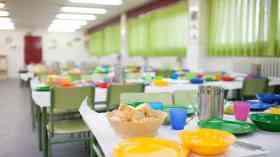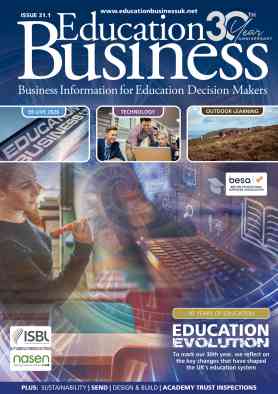Pack your overnight bag
 High-quality residential experiences or ‘brilliant residentials’ provide powerful learning opportunities for young people of all ages and abilities, and have a big impact on teachers. Since 2009 Learning Away has been working with 60 schools to discover the positive impact that these experiences can have on learner engagement, achievement and relationships, as well as the professional development opportunities it can provide for teaching staff.
High-quality residential experiences or ‘brilliant residentials’ provide powerful learning opportunities for young people of all ages and abilities, and have a big impact on teachers. Since 2009 Learning Away has been working with 60 schools to discover the positive impact that these experiences can have on learner engagement, achievement and relationships, as well as the professional development opportunities it can provide for teaching staff.
A year 10 student, from Canterbury Academy, said: “When I was at Hampton Court there was just loads of stuff to inspire me. I probably did more hours of work in that one week than I did in the whole term, I just had so much inspiration from it.”
Learning away
Learning Away schools have developed a range of exciting residential programmes that are often teacher and student designed and led, and include a wide range of lengths, activities and venues. Different types have been trialled e.g. low-cost models such as camping (on school sites, locally or further afield), co-construction partnerships with outdoor education and heritage providers, and school exchanges in urban and rural environments. Each school focused on the challenges relevant to its particular context such as GCSE attainment, Key Stage 2 literacy, family support, transition, cultural diversity and community cohesion.
A final evaluation report into Learning Away (using information from surveys and focus groups with students and teachers) will be published in June, but interim reports have highlighted that the residential context is an environment where success can be celebrated and where students are less judgemental and more collaborative. Significantly this sense of community continues long after their return to school.
Learning Away has generated new insights about how and why residentials achieve these benefits. We now understand more about how to plan, design and deliver brilliant residentials, so that benefits to the curriculum and to learning are maximised. We are also discovering that residentials do not need to be expensive, and can offer good value for money.
Long-term benefits for students
Residentials have a number of positive impacts for students. Evidence from our evaluation of Learning Away shows that they can, and commonly do foster deeper relationships particularly between students and with teaching staff. Residentials also are proven to improve students’ resilience, self-confidence and wellbeing, students’ engagement with learning, support students’ achievement and improve students’ knowledge, skills and understanding.
Further to this, residential are key to boosting cohesion and a sense of belonging, smoothing students’ transition experiences and providing opportunities for student leadership, co-design and facilitation.
Key findings from the evaluation show that 70 per cent of Key Stage 2 students felt they knew their teachers better and 71 per cent felt they got on better with their peers as a result of their residential experiences.
More than 80 per cent of secondary students felt that the residential had helped improve their relationships with their peers and teachers. Interestingly, 72 per cent of secondary students felt that as a result of the residential their teachers had a better understanding of how they liked to learn best.
Post residential, the majority of Key Stage 2 and secondary students were proud of what they achieved on the trip (82 per cent and 91 per cent respectively) and these views were maintained in the long-term follow-up surveys (83 per cent and 79 per cent). Additionally, 78 per cent of Key Stage 2 students and 88 per cent of secondary students stated that they felt more confident to try new things as a result of their residential experience.
Teachers felt that the residential facilitated development of these outcomes by providing activities and experiences that challenged students and gave them new experiences, as well as the opportunity to develop new relationships within a supportive group environment. Importantly, they also felt that the residentials gave students opportunities to be more independent and helped develop their resilience.
Post residential
58 per cent of Key Stage 2 students thought they would do better in their schoolwork as a result of the residential and 48 per cent felt they would do better in their tests or SATs. The views of secondary students continued to be positive in post residential, with two thirds or more of respondents thinking that as a result of the residential they would make better progress in their subject (71 per cent), had a better understanding of the subject (70 per cent), they were better at problem solving (67 per cent) and would do better in their exams/tests (66 per cent).
Secondary students were most positive about how they were taught on the residential, with 77 per cent saying that the way they were taught on the residential would help them do better in the subject.
The Secondary Student Focus Group commented: “I wouldn’t normally be in school until this time now [10.30 am] and the trip has made me realise that I need my education, I enjoy education, I enjoy learning and I was in school at half eight this morning, which is a whole two hours before I normally am.”
Benefits for teachers
Residentials also have a number of positive benefits for teachers, who develop better relationships with their students, see them in a completely different light and gain a better understanding of their students’ strengths and limitations
Teachers involved in Learning Away also believe that, as a result of their residential experiences, they have become more experimental and flexible in their teaching and have more confidence to try different types of teaching. Residentials give them time to reflect on their practice and think more about how they deliver their teaching.
The Secondary Staff Focus Group said: “My teaching is much more kinaesthetic, more practical, more moving around, it’s trusting the kids a little bit more to be able to behave. Before the residential, I was probably a little bit afraid about doing that sort of thing, whereas now I know I can handle it, it’s fine and I’m getting much more positive results from it, which is really great.”
The impact of residentials
Learning Away has identified why residential experiences lead to such positive outcomes. Firstly residentials are a leveller, providing a space where participants are equal and existing barriers and hierarchies can be broken down. This allows students to see different qualities in each other and their teachers, both on the residential and back in school.
Additionally, the time, space and intensity of the experience are significant. Participants are away from home for an extended period of time, away from their usual routines and distractions. This provides opportunities for them to be immersed in learning and to develop positive relationships. Unstructured time also gives opportunities for discussion, self-reflection and more informal learning.
Residentials enable participants to create a ‘Learning Away community’; giving them time and space to address personal and learning goals within a supportive environment. They help develop a sense of responsibility and maturity; participants are responsible for themselves and others and this promotes self-reliance and teamwork.
Furthermore, the memorability of the residential experience and the shared memories help to maintain the sense of community developed once back in school and to sustain the positive impacts. Providing an opportunity to experience success in a range of practical and physical challenges impacts on confidence, self‑belief, motivation and engagement. Success in residential activities is linked to success in the subject and these memories remain when students return to school.
Residentials can provide a context for students and teachers to explore new ways of teaching and learning (e.g. experiential and context-based learning), which help develop students’ understanding and facilitates their engagement with, and progress in, learning. Residentials also provide opportunities for students to revisit and build on their learning experiences from one day to the next.
What makes a great residential?
In order to provide high-quality or brilliant residentials for all students, schools should try to provide a range of progressive and inclusive residential experiences that are integrated with class-based and LOtC activities.Schools should also develop clear learning objectives for residentials based on student’s needs and share these with providers.
Schools should plan to embed and reinforce learning from the residential once back in school and involve students and staff in planning and delivering high-quality residential learning collaboratively. It remains important to recognise and plan for the value of informal social time during residentials and plan for rigorous evaluation as an essential part of the residential programme using both quantitative and qualitative methods.
The school community
Elsewhere, teachers should look within the wider school community for residential expertise and, when appropriate, for volunteer adults and student leaders. Investigating lower-cost residentials; when appropriate these can often provide better outcomes, as can using Pupil Premium to support students who would not otherwise be able to attend – Learning Away has demonstrated the positive impact of doing so on achievement.
Schools choosing outdoor adventure centres, field study centres or other providers to deliver their residentials should identify a provider who understands the importance and value of a partnership approach, and is prepared to arrange a programme tailored to the needs of your students.
Additionally, schools should identify a provider who understands that residentials are more effective when there is active teacher and student involvement in their planning and delivery.
Working closely with providers during the planning process to ensure the right mix of activities and delivery, and feel confident to ask them for flexibility is significant, while identifying a provider with accreditation that quality assures the learning experience, as well as safety should be a clear focus.
Learning Away, a special initiative of the Paul Hamlyn Foundation
Further information
www.learningaway.org.uk
www.phf.org.uk
Latest News
26/01/2026 - 10:40
The proposed Scottish Budget for 2026-27 commits up to £200 million to the Scottish Attainment Challenge.
26/01/2026 - 10:24
The Welsh Government has set out the key challenges facing tertiary education in Wales and has launched a call for evidence to help address these challenges.
23/01/2026 - 10:47
Almost half (45%) of school leaders needed mental health and well-being support in just a year, a new survey from union NAHT has found.
22/01/2026 - 10:44
The film, ‘The Lunch They Deserve’, seeks to focus the nation on the need for better school food standards before the provision of Free School Meals is extended.
21/01/2026 - 11:24
Speaking at the Bett UK Conference, the Education Secretary said the EdTech Testbed will recruit schools and colleges to put the latest tech and AI tools through their paces.







